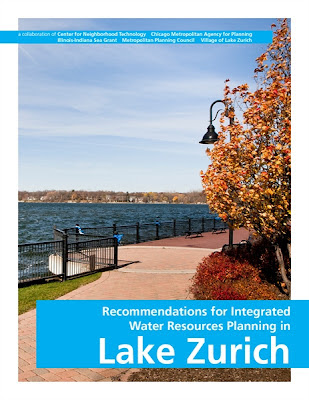Category:
Leaks can run, but they can’t hide
March 16th, 2015 by iisg_superadminNew manual provides the how-tos of outdoor water conservation
August 15th, 2013 by Irene MilesThe manual comes just as the height of the summer season has led some areas to enact strict watering policies or, in the recent case of Lake Forest, institute a temporary ban on outdoor watering altogether.
Blue Island stormwater program gets major recognition
June 7th, 2013 by Irene MilesWith such a rainy and flood-producing spring, one’s thoughts may just turn to something practical–rain barrels. Let’s look back on last fall’s rain barrel project in Blue Island.
Illinois-Indiana Sea Grant was one of five lead partners in the “Blue Island, Blue Water” community-based program designed to reduce stormwater overflows and flooding issues in the Chicago suburb. Over the course of the project, more than 140 volunteers installed rain barrels at 33 different residential locations and three institutional buildings. Additionally, more than 1000 plants and nearly 100 trees were planted to help improve water management and beautify neighborhoods at the same time.
“Keeping water out of sewers also reduces run-off, which in turn reduces pollution in the Cal-Sag Channel. The Cal-Sag is an increasingly popular destination for Chicagoland kayakers and nature lovers, but the channel requires a strong commitment to water quality, since it runs through densely built residential and industrial areas that are potential sources of pollution. Thus, stormwater management in Blue Island represents a key effort in which ‘local, state and county governments work together to really make an impact in our neighborhoods,’ according to (zoning administrator and director of special projects Jason) Berry.”
The “Blue Island, Blue Water” project was also chosen as a 2012 Millenium Reserve Model Project. The project’s inclusion also makes it part of the President’s “America’s Great Outdoors Initiative,” which helps align federal efforts and funds with conservation and recreation projects on the local level where they can make real and immediate impacts. You can learn more about the project at the links above and at this ABC 7 news report from earlier this year. And read more about the Millennium Reserve’s place within the initiative here.
Lake Zurich water resources planning report now available
June 12th, 2012 by Irene MilesThe report combines study and information of a wide range of factors in order to provide appropriate recommendations for planning the community’s use of water.
Recent News
- Tomas Höök signing off as Illinois-Indiana Sea Grant director this summer
- Illinois-Indiana Sea Grant welcomes Stuart Carlton as the program’s new director
- Four Illinois and Indiana educators will set sail on Lake Michigan aboard EPA’s research ship
- Join IISG as a new pollution prevention outreach assistant
- Beach season means it’s time for lifesaving Lake Michigan water safety resources
IISG Instagram
The Shipboard Science Immersion educators worked together to simulate sonar mapping and uncover the secrets of a mystery seabed, just like real underwater archaeologists!
This hands-on lesson mirrors the work of Dr. Ashley Lemke from University of Wisconsin Milwaukee who studies paleo landscapes below Lake Michigan by collecting sonar data from lakebeds. Experiences like these can be shared with youth to spark curiosity and connect them to real-world science in action.
#LakeMichigan #GreatLakes

15 educators from 7 Great Lakes states have boarded the R/V Lake Guardian for a week of science on Lake Michigan!
Day one was all about meeting fellow educators and the science team from the @epa_greatlakes, @uwmilwaukee, and @purduefnr, and getting shipboard safety training.
This hands-on program, supported by the Great Lakes Restoration Initiative, helps bring Great Lakes science into classrooms and builds educator-scientist partnerships.
Follow along as we explore water quality, food webs, and even underwater archaeology!
#GreatLakes #LakeMichigan

Ready for a party? Join us on the newly-expanded Wild Mile for a celebration of our urban waterways and thriving park spaces. Enjoy local beer, food trucks, and an outdoorsy prize drawing while learning about local environmental nonprofits and volunteer opportunities! This event is free and fun for all ages!
The block party is rain-or-shine, and we`ll only cancel in the case of hazardous weather!
This year’s community partners include @Openlands, Current Water, @chicago_enviro, @cleanupclub_chicago, @chicago_birder, Blazing Star School, @cubillinois, Friends of the Bloomingdale Trail, @chicagoshapers, @reducewastechicago, Southern Utah Wilderness Alliance, and @honeycombproject!
Learn more at the link in bio.

📢 Show Your Support for Sea Grant! 📢
Continued federal funding for Sea Grant in FY26 is crucial, and we need your help to demonstrate the nationwide support for these essential programs.
🖊️ Sign the letter urging Congress to continue funding Illinois-Indiana Sea Grant and all 34 state Sea Grant programs:
🔗 https://forms.gle/7sPGHGyh8j8a7vfGA or link in bio

Categories
- Aquaculture
- Aquatic Invasive Species
- Buoys
- Climate Ready Communities
- Director's Blog
- Education
- Featured
- Fellowships
- Fisheries
- Funded Research
- Funding
- Great Lakes Cleanup
- Great Lakes Data
- Healthy Waters
- Internships
- Jobs
- K-12 Education
- News
- Photos
- Program
- Recreation & Tourism
- Resources
- Sea Grant Scholars
- Stormwater & Green Infrastructure
- Sustainable Community Planning
- The Helm
- Uncategorized
- Video
- Water Resource Economics



